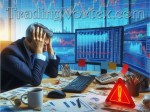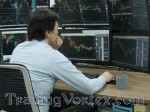Table Of Contents:
- Introduction:
- Understanding Fear in Trading:
- Strategies to Overcome Fear:
- Understanding Greed in Trading:
- Strategies to Overcome Greed:
- Developing Emotional Intelligence for Traders:
- Tools and Techniques for Managing Trading Emotions:
- Creating a Sustainable Trading Mindset:
- Mastering the Markets – Your Journey to Success:
- Frequently Asked Questions (FAQs):
Introduction:
Trading the markets isn't just about numbers, charts, and algorithms. Sure, the technical aspects are crucial, but let's be real – your mindset can make or break you. Picture this: you've done your homework, identified a promising trade, and right as you’re about to pull the trigger, your heart races, your palms sweat, and a little voice in your head screams, "What if it goes wrong?" That’s fear talking. On the flip side, imagine your trades are hitting all-time highs. You feel invincible, doubling down, thinking you can't lose. That’s greed whispering sweet nothings in your ear. Both emotions are potent, and if left unchecked, they can derail even the most meticulous trading strategies.
Overview of Trading Psychology:
Let’s dive into the psyche of a trader. Trading psychology is all about understanding how emotions and mental state influence your trading decisions. It’s the study of human behavior in the trading environment, and trust me, it’s as fascinating as it is crucial. You see, the markets are a battleground of wits, strategy, and yes, emotions. Fear and greed are the primary emotions driving market behavior, creating patterns that traders try to decipher.
But here’s the kicker – while everyone’s trying to predict the market, the smartest traders are the ones who first learn to understand themselves.
The Impact of Emotions on Trading Decisions:
Now, let’s talk about how emotions can wreak havoc on your trades.
- Ever sold a stock too early because you were scared of losing more money?
- Or maybe you held onto a plummeting stock, hoping it would rebound, only to watch it sink further?
These are classic examples of fear and greed at play.
- Fear can paralyze you, make you second-guess your decisions, and lead to premature exits.
- Greed, on the other hand, can blind you to risks, push you to overtrade, and inflate your ego to dangerous levels.
It’s like trying to drive a car with your eyes closed – you’re bound to crash.
Importance of Managing Fear and Greed in Trading:
Managing these emotions isn't just important; it's essential. Think of it as the foundation of successful trading. Without a solid emotional base, even the best strategies can fall apart. When you learn to control fear, you stop making decisions based on panic and start relying on your analysis and instincts. Overcoming greed ensures you stick to your trading plan, take profits at the right time, and avoid unnecessary risks. It’s about finding that sweet spot where you’re confident yet cautious, aggressive yet disciplined.
As a trader, I’ve been there – felt the adrenaline rush of a big win and the gut-wrenching panic of a sudden loss. I’ve learned that mastering your emotions is a continuous journey, one that pays off not just in profits but in peace of mind. So, buckle up, because we’re about to explore how you can conquer the twin beasts of fear and greed, and emerge as a more resilient, savvy trader.
Understanding Fear in Trading:
What is Fear in Trading?
Fear in trading is that knot in your stomach when the market takes a nosedive, the jittery hands when you’re about to place a trade, or the impulse to pull out of a position prematurely. It’s a natural, often subconscious response to the potential of loss, and let’s face it, losing money is never fun. Fear can stem from various sources – a lack of confidence in your strategy, past trading mishaps, or just the sheer unpredictability of the markets. But the key to conquering this beast is understanding what triggers it and how it manifests in your trading decisions.
Common Triggers of Fear in the Markets:
Market Volatility:
Ah, market volatility – the wild roller coaster ride that can make even the most seasoned traders a bit queasy. Rapid price swings can ignite fear as they bring uncertainty and risk. Imagine watching a stock you’ve invested in plummet within minutes. Your mind races: “Should I sell now and cut my losses? What if it drops even more?” This fear can lead to rash decisions, like selling at the worst possible moment, only to see the stock rebound shortly after.
Negative News and Events:
The news can be a trader’s best friend or worst enemy. Negative news – whether it’s a disappointing earnings report, geopolitical tensions, or an economic downturn – can spark fear. I remember back in 2008, during the financial crisis, the constant barrage of bad news had everyone on edge. Each headline seemed to bring more doom and gloom, making it hard to stay calm and think rationally. The fear of further losses can cloud your judgment, causing you to exit positions too soon or avoid entering potentially profitable trades.
Personal Losses and Past Failures:
We’ve all been there – a bad trade that haunts you, making you second-guess your every move. Personal losses and past failures can create a lingering fear, a sort of PTSD for traders. After a big loss, you might find yourself hesitant to take on new trades, fearing a repeat performance. This fear can cripple your trading, leading to missed opportunities and a constant state of anxiety. It’s like touching a hot stove – once burned, twice shy.
Case Studies: Fear-Induced Trading Mistakes:
To illustrate how fear can impact trading decisions, let’s look at a couple of case studies.
Case Study 1 – The Hesitant Trader:
John, a relatively new trader, had built a promising position in a tech stock. As the market started to dip, he panicked. Despite his research indicating the stock had strong fundamentals, the fear of further losses took over. He sold his position at a loss, only to see the stock rally to new highs shortly after. John’s fear of the temporary dip cost him significant gains.
Case Study 2 – The Paralyzed Investor:
Sarah, an experienced trader, faced a similar scenario during a period of high market volatility. She had a diversified portfolio but found herself paralyzed by the rapid market fluctuations. Fearful of making the wrong move, she decided to sit on the sidelines. While she watched, the market presented several buying opportunities that she missed. Her fear of making a mistake resulted in a stagnant portfolio during a time when others capitalized on the volatility.
Conclusion:
Understanding fear in trading is the first step to mastering it. Recognizing its triggers – from market volatility and negative news to personal losses – helps you anticipate and manage your emotional responses. Remember, every trader faces fear, but what sets successful traders apart is their ability to navigate these emotions without letting them dictate their decisions. By learning from past mistakes and keeping a cool head, you can turn fear into a tool that sharpens your trading acumen rather than an obstacle that hinders your success.
Strategies to Overcome Fear:
Alright, we've talked about how fear can mess with your trading game, but now let's get into the good stuff – how to tackle it head-on. Fear might be a natural reaction, but with the right strategies, you can keep it from dictating your trading decisions. Here’s a blueprint to help you trade with more confidence and less anxiety.
Developing a Solid Trading Plan:
First things first: having a robust trading plan is like having a trusty roadmap. Without it, you're navigating the markets blindfolded. A solid trading plan outlines your entry and exit points, risk tolerance, and the criteria you use to choose your trades. When you have a plan, you’re not just reacting to the market's every whim – you’re executing a strategy. I remember when I first started trading, I would jump in and out based on gut feelings. It was chaos. Once I set up a structured plan, my confidence soared because I had clear guidelines to follow, reducing the guesswork and the fear.
Setting Realistic Goals and Expectations:
Let’s keep it real – expecting to double your money overnight is a fantasy that can set you up for disappointment and fear. Setting realistic, achievable goals keeps you grounded. It’s about making steady progress rather than chasing huge, unlikely wins. Think of it like training for a marathon. You wouldn’t expect to run 26 miles without months of preparation. Trading is the same. Break your goals into smaller, manageable milestones. Celebrate the small victories, and soon, they’ll add up to significant gains.
Utilizing Stop-Loss Orders:
Stop-loss orders are your safety net. They automatically sell a stock when it reaches a certain price, protecting you from massive losses. Using stop-loss orders means you don't have to constantly watch the markets, worried about every dip. It’s like having an emergency brake on a downhill ride – if things go south, you have a predetermined exit. I learned this the hard way when a promising trade turned sour overnight. Had I set a stop-loss, I’d have limited my losses instead of waking up to a painful surprise.
Embracing a Long-Term Perspective:
Trading isn’t a sprint; it’s a marathon. Embracing a long-term perspective can help you weather short-term volatility without panic. Markets will always have their ups and downs, but historically, they trend upward over time. When you focus on the bigger picture, you’re less likely to make fear-driven decisions based on daily market noise. I used to fret over every little market fluctuation until a mentor reminded me to zoom out and look at the overall trend. It was a game-changer. Now, I keep my eyes on my long-term goals, which helps me stay calm during the inevitable bumps in the road.
Practicing Mindfulness and Stress Management Techniques:
Mindfulness and stress management aren’t just for yogis – they’re essential tools for traders too. Techniques like deep breathing, meditation, and even regular exercise can help keep your stress levels in check. When you’re calm, you’re better equipped to make rational decisions instead of reacting out of fear. I make it a point to start my trading day with a few minutes of mindfulness. It might sound cheesy, but those moments of calm help center me and prepare me for whatever the market throws my way. Find what works for you – whether it’s a morning jog, a few minutes of meditation, or just some deep breaths before you start trading.
Conclusion:
Fear is a formidable opponent in the world of trading, but it’s not invincible. By developing a solid trading plan, setting realistic goals, using stop-loss orders, maintaining a long-term perspective, and practicing mindfulness, you can keep fear from sabotaging your trading efforts. Remember, every trader faces fear – it’s how you manage it that sets you apart. So, arm yourself with these strategies, stay calm, and trade on with confidence. After all, the market rewards those who can keep a cool head.
Understanding Greed in Trading:
Alright, let’s flip the coin and talk about the other major player in the emotional trading game: greed. While fear can make you hesitate and miss opportunities, greed can push you to take reckless risks, often with disastrous results. Greed in trading is like that sweet but dangerous siren call, luring you into risky waters with the promise of massive rewards.
What is Greed in Trading?
Greed in trading is the insatiable desire for more – more profits, more success, more everything. It’s that rush you get when a trade goes your way, and instead of sticking to your plan, you push for just a bit more. It’s the reason some traders hold onto positions way past their sell point, thinking the market will keep climbing indefinitely. Greed isn’t inherently bad – after all, the pursuit of profit is why we trade – but when it goes unchecked, it can cloud your judgment and lead to some seriously bad decisions.
Common Triggers of Greed in the Markets:
Chasing High Returns:
One of the most common triggers of greed is the temptation to chase high returns. You see a stock skyrocketing, and you can't help but jump on the bandwagon, hoping to catch the wave. This is often fueled by stories of other traders who’ve struck it rich with a single trade. I’ve been there, caught up in the hype, buying into a stock that's already surged, only to watch it plummet shortly after. The fear of missing out (FOMO) is a powerful motivator, but it can lead to buying high and selling low – the exact opposite of what we aim for.
Overleveraging Positions:
Leverage can be a double-edged sword. Used wisely, it can amplify your gains. But when greed takes the reins, you might find yourself overleveraging – borrowing more money to invest than you can afford to lose. This can lead to enormous losses if the market moves against you. I once met a trader at a seminar who bragged about his high-leverage trades. He made big money quickly, but one bad trade wiped out his account. The lesson? Overleveraging can turn a minor setback into a catastrophic loss.
Ignoring Risk Management Principles:
Greed can make even seasoned traders throw caution to the wind. You might find yourself ignoring fundamental risk management principles, such as setting stop-loss orders or diversifying your portfolio. The allure of big gains can make you think you’re invincible, leading to overconfidence. I’ve seen traders who ignore these principles during a hot streak, only to be blindsided by a market correction. Remember, the markets have a way of humbling us all.
Case Studies – Greed-Induced Trading Mistakes:
Let’s dive into some real-world examples to see how greed can lead traders astray.
Case Study 1 – The High-Flying Tech Stock:
Tom, an experienced trader, couldn’t resist the buzz around a skyrocketing tech stock. He bought in after a significant price increase, thinking it would keep climbing. As the stock surged, he kept adding to his position, convinced it was a one-way ticket to wealth. Then, the market corrected, and the stock’s value plummeted. Tom held on, hoping for a rebound that never came, and eventually sold at a substantial loss. His greed for more profits led him to ignore the stock’s overvaluation and the basic principle of not putting all his eggs in one basket.
Case Study 2 – The Overleveraged Gambler:
Lisa, relatively new to trading, decided to use leverage to maximize her returns. Encouraged by initial successes, she kept increasing her leveraged positions, ignoring the mounting risk. When a major economic report caused the market to swing unexpectedly, her positions were wiped out. She faced a margin call and had to sell off assets at a loss to cover it. Lisa’s greed for higher returns through leverage cost her not just her gains but her entire trading capital.
Conclusion:
Greed in trading is a powerful force that can lead to reckless behavior and significant losses. By understanding its common triggers – chasing high returns, overleveraging, and ignoring risk management principles – you can recognize when greed is influencing your decisions. Remember, successful trading isn’t about hitting home runs with every trade; it’s about consistent, disciplined, and well-managed growth. Stay grounded, stick to your plan, and let the lessons from others’ greed-induced mistakes guide you towards a more balanced and successful trading journey.
Strategies to Overcome Greed:
Greed can be a seductive siren in the trading world, enticing you to push beyond reason and risk more than you should. However, with the right strategies, you can keep greed in check and make smarter, more disciplined trading decisions. Here’s how you can overcome the allure of greed and trade with a balanced mindset.
Creating a Balanced Risk-Reward Strategy:
The first step to overcoming greed is creating a balanced risk-reward strategy. This involves evaluating each trade for its potential risks versus its potential rewards. You should aim for a strategy where the potential reward significantly outweighs the risk.
I remember when I first started trading, I was so focused on the potential gains that I often overlooked the risks. Now, I always ask myself, “Is this trade worth the potential downside?” By setting a risk-reward ratio (like 1:3), you ensure that your trades are more calculated and less driven by the desire for quick profits.
Sticking to Your Trading Plan:
We’ve all been there: you’ve developed a solid trading plan, but then a trade starts going well, and you’re tempted to deviate, thinking you can squeeze out just a bit more profit. This is greed at work. Sticking to your trading plan is crucial. Your plan was created when you were calm and rational, not caught up in the excitement of a winning streak.
Think of it like a diet – if you’ve planned your meals to stay healthy, sticking to that plan is what keeps you on track. When you start indulging on impulse, things can go awry quickly. Trust your plan and follow it religiously.
Setting Profit Targets and Taking Regular Profits:
One of the best ways to keep greed at bay is by setting clear profit targets and taking profits regularly. Decide in advance the profit level at which you will sell part or all of your position. This prevents you from holding on too long, hoping for an even bigger gain and then watching your profits evaporate.
I like to set tiered profit targets – take a portion of the profit at a conservative level, another portion at a moderate level, and let the rest ride with a trailing stop. This way, you lock in gains and still have the opportunity to benefit from further upside without being overly greedy.
Implementing Position Sizing Rules:
Position sizing is another critical strategy to manage greed. By limiting the amount of capital you allocate to any single trade, you can protect yourself from catastrophic losses. This means not betting the farm on one “sure thing.”
I used to put too much into trades that seemed like a golden opportunity, only to be burned when the market turned against me. Now, I use a fixed percentage of my trading capital for each trade, ensuring I never risk too much on one position. This approach keeps your portfolio balanced and reduces the temptation to go all-in on risky trades.
Practicing Self-Discipline and Patience:
Finally, let’s talk about self-discipline and patience – the unsung heroes of trading. Greed thrives on impulsivity and the rush of the moment. By practicing self-discipline, you can train yourself to resist the urge to make hasty decisions. Set rules for yourself, like a mandatory cool-down period before making a trade, and stick to them. Patience is equally important. Good trades often take time to develop, and resisting the urge to jump in or out prematurely can pay off. I’ve found that stepping away from the screen and doing something else when I feel the pull of greed helps me return with a clearer, more rational mindset.
Conclusion:
Overcoming greed in trading is about building and following a disciplined, well-thought-out approach. By creating a balanced risk-reward strategy, sticking to your trading plan, setting profit targets, implementing position sizing rules, and practicing self-discipline and patience, you can keep greed in check and make more rational trading decisions. Remember, trading is a marathon, not a sprint. The goal is steady, consistent growth, not the thrill of the quick win. So, stay grounded, trust your strategy, and let disciplined trading pave the way to your success.
Developing Emotional Intelligence for Traders:
The Role of Emotional Intelligence in Trading:
Emotional intelligence (EI) is the secret weapon many top traders swear by, even if they don’t always talk about it. It’s the ability to recognize, understand, and manage your own emotions while also being able to understand and influence the emotions of others. In the high-stakes, fast-paced world of trading, where fear and greed are constantly at play, having high EI can be the difference between making a rash decision and executing a well-thought-out strategy. Think of EI as your internal GPS, helping you navigate the emotional ups and downs of trading with clarity and composure.
Techniques to Improve Emotional Intelligence:
Self-Awareness:
Self-awareness is the cornerstone of emotional intelligence. It’s about understanding your own emotional triggers and how they impact your trading decisions. Start by keeping a trading journal. Note down your emotional state before, during, and after trades. Over time, patterns will emerge, helping you understand what emotions drive your decisions. I used to get overly excited during market rallies, often leading to impulsive trades. By journaling, I recognized this pattern and learned to take a step back, breathe, and reassess my strategy before diving in.
Self-Regulation:
Once you’re aware of your emotional triggers, the next step is self-regulation – managing your emotional responses. This doesn’t mean suppressing your emotions, but rather controlling how you react to them. Techniques like deep breathing, meditation, and setting clear rules for yourself can help. For instance, I’ve made it a rule to never place a trade when I’m feeling particularly stressed or euphoric. Instead, I take a few minutes to calm down and ensure my decisions are based on logic and analysis, not emotions.
Social Awareness:
In trading, social awareness translates to understanding market sentiment and how it affects trader behavior. This means paying attention to news, market trends, and the emotions driving other traders. Being attuned to market sentiment can give you an edge, allowing you to anticipate moves and react accordingly. I often follow trading forums and social media to gauge the general mood. It’s amazing how much insight you can gain by understanding what others are feeling – whether it’s fear, greed, or something in between.
Relationship Management:
While trading might seem like a solitary activity, relationship management is still crucial. Building a network of fellow traders can provide support, insights, and different perspectives. Engaging in discussions, sharing experiences, and learning from others can significantly enhance your trading skills. I’ve found that having a few trusted trader friends to bounce ideas off and discuss market conditions helps keep me grounded and offers valuable perspectives I might have missed on my own.
Benefits of High Emotional Intelligence in Trading Performance:
Having high emotional intelligence brings numerous benefits to your trading performance. For starters, it helps you stay calm under pressure, making it easier to stick to your trading plan and avoid knee-jerk reactions. It also improves your ability to make rational decisions, as you’re better equipped to recognize and control emotional impulses. Furthermore, understanding market sentiment and managing relationships within the trading community can lead to better insights and more informed decisions.
Personally, I’ve noticed that since focusing on developing my emotional intelligence, my trading has become more consistent and less stressful. I’m not saying it’s a magic bullet – there will always be losses and tough days – but being emotionally intelligent helps me navigate those challenges with a clearer mind and a steadier hand.
Conclusion:
Developing emotional intelligence is not just a nice-to-have skill in trading; it’s essential. By improving your self-awareness, self-regulation, social awareness, and relationship management, you can significantly enhance your trading performance. Remember, the market is a complex ecosystem driven by human emotions. The better you understand and manage these emotions – both yours and others’ – the more successful you’ll be. So, invest in your emotional intelligence, and watch how it transforms your trading journey from a roller coaster of highs and lows to a more balanced and rewarding experience.
Tools and Techniques for Managing Trading Emotions:
Trading emotions can be like a roller coaster ride – exhilarating highs followed by stomach-churning lows. But fear not, my fellow traders, for there are tools and techniques out there to help you navigate the emotional ups and downs of the markets. Let’s dive into some of the most effective ones:
Journaling and Tracking Emotional Responses:
Ever heard the phrase, “The unexamined life is not worth living?” Well, the same goes for trading. Keeping a trading journal is like having a therapist for your trades. It allows you to track your emotional responses to different market conditions, helping you identify patterns and triggers. Did you panic sell during a market dip? Write it down. Did you feel a rush of euphoria after a winning trade? Write it down. Over time, you’ll gain valuable insights into your emotional tendencies, allowing you to anticipate and manage them more effectively. Plus, it’s a great way to vent your frustrations without scaring your family with your trading tales!
Using Trading Simulators to Practice Emotional Control:
Trading simulators are the ultimate training ground for mastering your emotions. These virtual trading platforms allow you to practice making trades in real-time without risking real money. It’s like playing a video game, but with actual stakes (well, sort of). The beauty of simulators is that they let you experience the emotional highs and lows of trading without the financial consequences.
- Did a trade go south? No worries – it’s just pretend money.
- Did a trade go well? Celebrate without worrying about blowing your real account.
By practicing emotional control in a risk-free environment, you’ll build the resilience needed to stay cool under pressure when real money is on the line.
Leveraging Technology – Trading Bots and Algorithms:
In today’s digital age, technology is your best friend when it comes to managing trading emotions. Trading bots and algorithms are like your personal trading assistants, executing trades based on pre-programmed rules without the interference of pesky emotions. They can help take the emotion out of trading by sticking to your strategy no matter what. Of course, it’s essential to use them wisely and monitor their performance regularly, but when used correctly, they can be powerful tools for keeping greed and fear in check.
Joining Trading Communities and Seeking Mentorship:
Last but certainly not least, don’t underestimate the power of community and mentorship in managing trading emotions. Surrounding yourself with like-minded traders who understand what you’re going through can provide invaluable support and perspective. Whether it’s joining online forums, attending trading meetups, or seeking out a mentor, having a network of experienced traders to lean on can make all the difference. Plus, sharing your experiences and learning from others can help normalize the emotional roller coaster of trading and remind you that you’re not alone in this journey.
Conclusion:
Managing trading emotions is no easy feat, but with the right tools and techniques, it’s entirely achievable. Whether it’s journaling to track your emotional responses, using trading simulators to practice emotional control, leveraging technology like trading bots and algorithms, or joining trading communities and seeking mentorship, there are plenty of resources at your disposal. So, embrace these tools, experiment with different techniques, and remember – trading is as much about mastering your emotions as it is about mastering the markets. With a little practice and perseverance, you’ll be well on your way to becoming a more disciplined and emotionally resilient trader.
Creating a Sustainable Trading Mindset:
Trading isn’t just about making money; it’s about building a sustainable mindset that can weather the storms of the market. It’s about developing habits and attitudes that keep you grounded and resilient, even when fear and greed come knocking at your door. Let’s explore some strategies for cultivating a sustainable trading mindset:
Building Confidence Through Continuous Learning:
Confidence isn’t something you’re born with; it’s something you build through experience and knowledge. The more you know, the more confident you’ll feel in your trading decisions. That’s why continuous learning is key. Whether it’s reading books, attending seminars, or watching educational videos, never stop expanding your knowledge base.
I remember feeling overwhelmed when I first started trading, but as I learned more and gained experience, my confidence grew. Now, I approach each trade with a sense of calm assurance, knowing that I’ve put in the work to understand the markets.
Emphasizing Process Over Outcomes:
In trading, outcomes can be unpredictable – you win some, you lose some. Instead of fixating on the end result, focus on the process. What matters is not whether you make money on a particular trade, but whether you followed your trading plan and executed your strategy effectively.
I used to get hung up on individual trades, beating myself up over losses and getting overly excited about wins. But I’ve learned to detach myself from the outcome and focus on the process instead. Did I stick to my risk management rules? Did I execute my trades according to plan? If the answer is yes, then I consider it a successful trade, regardless of the outcome.
Cultivating a Growth Mindset:
A growth mindset is the belief that your abilities and intelligence can be developed through hard work and dedication. In trading, this means embracing challenges, learning from failures, and constantly striving to improve. Instead of seeing setbacks as failures, see them as opportunities for growth.
I’ve had my fair share of losses and mistakes in trading, but each one has been a valuable learning experience. By adopting a growth mindset, you’ll approach trading with a sense of optimism and resilience, knowing that every challenge is a chance to become a better trader.
Balancing Life and Trading – Importance of Rest and Recreation:
Finally, let’s talk about the importance of balance. Trading can be all-consuming, but it’s essential to maintain a healthy balance between your trading life and your personal life. Take time to rest and recharge, engage in hobbies and activities you enjoy, and spend quality time with loved ones.
I used to fall into the trap of obsessing over the markets, checking my positions constantly and sacrificing sleep for the sake of a trade. But I soon realized that this lifestyle wasn’t sustainable. Now, I make it a point to prioritize self-care and relaxation, knowing that a well-rested mind is a sharper mind when it comes to trading.
Conclusion:
Creating a sustainable trading mindset is about more than just making money – it’s about building habits and attitudes that support your long-term success and well-being. By building confidence through continuous learning, emphasizing process over outcomes, cultivating a growth mindset, and balancing your trading life with rest and recreation, you’ll develop the resilience and resilience needed to navigate the highs and lows of the markets with grace and confidence. So, take care of yourself, keep learning and growing, and remember – trading is a marathon, not a sprint. With the right mindset, you’ll be well on your way to achieving your trading goals and enjoying a fulfilling trading journey.
Mastering the Markets – Your Journey to Success:
Ah, what a ride it’s been! We’ve covered a lot of ground in our quest to overcome fear and greed when trading the markets. From understanding the psychological pitfalls that can derail us to implementing practical strategies for managing our emotions, it’s been quite the adventure. So, let’s take a moment to reflect on our journey and look ahead to the road ahead.
Recap of Key Points:
First things first, let’s do a quick recap of the key points we’ve covered. We’ve delved into the depths of trading psychology, exploring the ins and outs of fear and greed and their impact on our decision-making. We’ve learned how to recognize and manage these powerful emotions, whether it’s through developing emotional intelligence, setting realistic goals, or practicing self-discipline. Along the way, we’ve discovered tools and techniques to help us stay grounded and resilient in the face of market volatility. It’s been a wild ride, but we’ve come out wiser and more prepared for whatever the markets throw our way.
Encouragement to Practice Emotional Management:
Now, I won’t sugarcoat it – mastering your emotions in trading is no easy feat. It takes time, practice, and a whole lot of self-awareness. But trust me when I say it’s worth it. By learning to control your fear and greed, you’ll become a more confident, disciplined trader, capable of making rational decisions even in the most challenging of circumstances. So, keep practicing emotional management techniques, whether it’s journaling, meditation, or seeking support from fellow traders. Rome wasn’t built in a day, and neither is a rock-solid trading mindset.
Final Thoughts on Achieving Success in Trading:
As we wrap up our journey, I want to leave you with a few final thoughts. Success in trading isn’t just about making money – it’s about achieving a sustainable, fulfilling trading journey. It’s about building habits and attitudes that support your long-term success and well-being. So, focus on the process, not just the outcome. Embrace challenges as opportunities for growth. And above all, remember to take care of yourself – both mentally and physically. Trading is a marathon, not a sprint, and with the right mindset and approach, you’ll be well on your way to achieving your trading goals.
So, my fellow traders, as you venture forth into the exciting world of trading, remember to keep fear and greed in check, stay disciplined, and never stop learning and growing. The markets can be a wild and unpredictable ride, but with the right mindset and strategies, you’ll be ready to tackle whatever comes your way. Here’s to your success – may your trades be profitable and your journey fulfilling. Happy trading!
Frequently Asked Questions (FAQs):
Trading can be a roller coaster of emotions, and it’s natural to have questions about how to navigate the highs and lows. Here are some of the most common questions traders ask about overcoming fear and greed in the markets:
Ah, the age-old question! Fear and greed are like the yin and yang of trading – two sides of the same emotional coin. Fear often stems from uncertainty and the fear of loss, while greed is driven by the desire for profit and the fear of missing out (FOMO). Market volatility, negative news, and personal experiences can all trigger these emotions, so it’s essential to stay vigilant and recognize when they’re influencing your decisions.
Ah, the million-dollar question! It’s not always easy to tell when emotions are creeping into your trading decisions, but there are some telltale signs to watch out for. Do you find yourself hesitating to pull the trigger on a trade out of fear? Or maybe you’re taking unnecessary risks in pursuit of bigger profits? These could be signs that your emotions are calling the shots. Keep an eye on your thoughts and feelings while trading, and don’t be afraid to take a step back and reassess if you feel like emotions are getting the better of you.
Ah, the age-old dilemma! Managing emotions in real-time can be challenging, but there are some quick tips you can employ to stay grounded. Deep breathing exercises can help calm your nerves, while visualization techniques can help you stay focused and confident. Setting strict trading rules and sticking to them can also help keep emotions in check. And of course, taking regular breaks and practicing self-care are essential for maintaining a clear, rational mindset.
Absolutely! Having a trading mentor can be incredibly valuable when it comes to emotional management. A mentor can offer guidance, support, and a fresh perspective on your trading decisions. They’ve been there, done that, and can offer insights based on their own experiences. Plus, having someone to talk to when things get tough can make all the difference. So, don’t be afraid to reach out to a mentor or join a trading community for support.
Ah, the pitfalls of fear and greed! There are plenty of common mistakes traders make when these emotions rear their ugly heads. Chasing high returns, overleveraging, and ignoring risk management principles are all classic examples of greed-induced mistakes. On the flip side, letting fear paralyze you into inaction or panic selling at the slightest sign of trouble are common fear-induced mistakes. The key is to stay aware of these pitfalls and actively work to avoid them. After all, forewarned is forearmed!








































 TradingVortex.com® 2019 © All Rights Reserved.
TradingVortex.com® 2019 © All Rights Reserved.